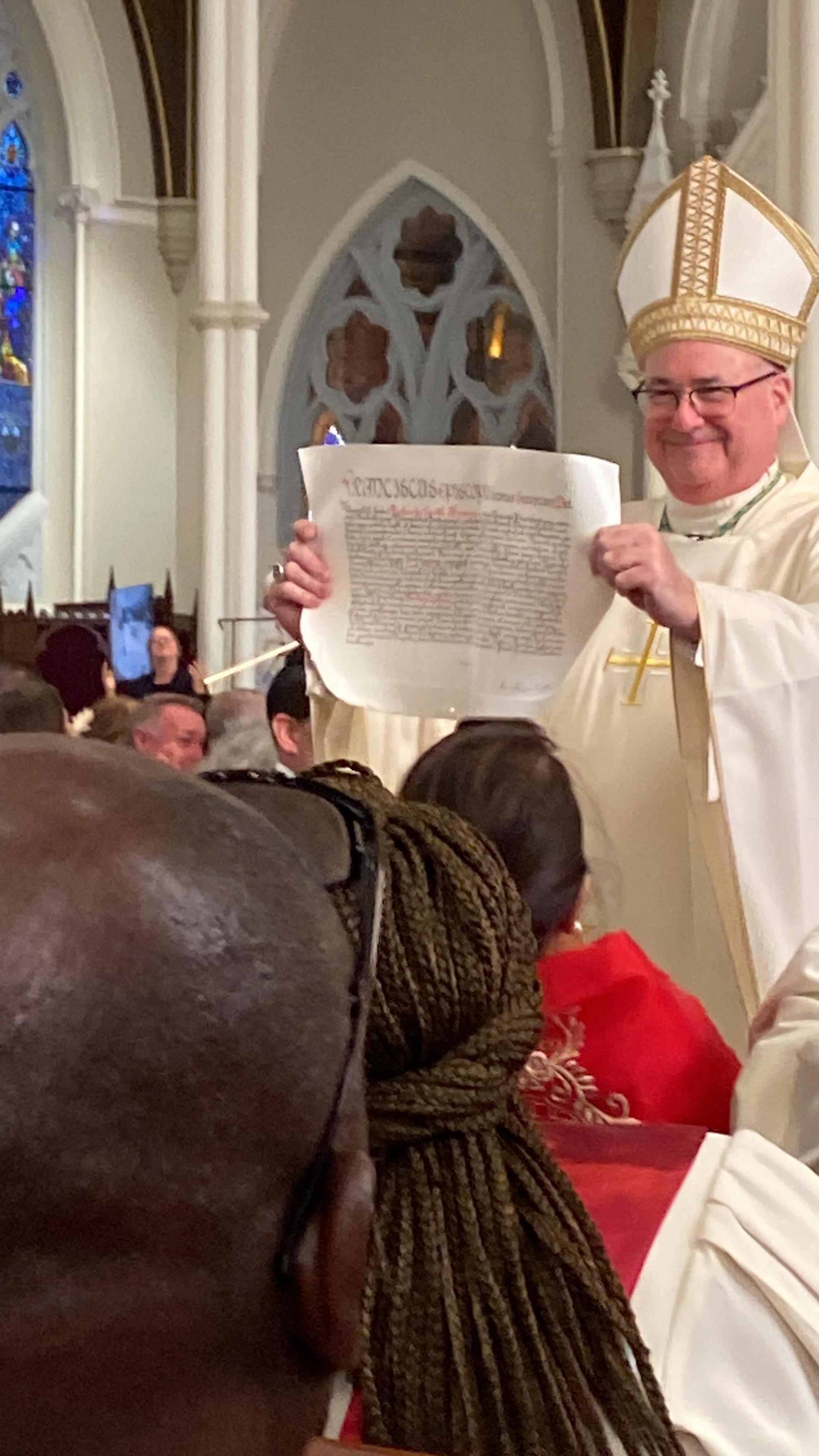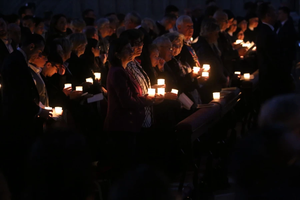New Boston Archbishop Challenges Flock to Develop ‘Deeply Personal’ Relationship With God
Archbishop Richard Henning replaces Cardinal Seán O’Malley.

Newly installed Boston Archbishop Richard Henning challenged people of the archdiocese Thursday to commit to a relationship with God even when it hurts, saying that’s what God does for them.
“He gives us the precious gift, the gift of his own heart: his Son,” Archbishop Henning said Oct. 31 during a packed two-hour-plus installation Mass at Boston’s Cathedral of the Holy Cross.
Archbishop Henning, 60, originally from Long Island and most recently bishop of Providence, Rhode Island, replaced Cardinal Seán O’Malley, who had led the Archdiocese of Boston since 2003.
As the 10th bishop and sixth archbishop of Boston, he is the first head of the diocese to come from New York, which he noted often leads to a question.
Ever since he was announced as Boston’s next archbishop in August, Archbishop Henning said, “People have been asking me about me — all kinds of questions, about my opinions, my personality traits and history. The most common question I’ve received in the last few months boils down to something like this: ‘Have you ever been, and are you now, or will you ever be, a Red Sox fan?’”
The congregants laughed. Then Archbishop Henning added: “Now, while that may be a very important question here in Boston, along with all those other ones, it seems to me that the most important thing that you, the people of this archdiocese, need to know about me is that I believe.”
Earlier, Cardinal Christophe Pierre, the apostolic nuncio to the United States, presented Archbishop Henning with his letter of appointment from Pope Francis, and, following tradition, Archbishop Henning walked around the cathedral displaying it to the congregants.

After that, Cardinal O’Malley and Cardinal Pierre escorted Henning to the bishop’s chair to the left of the altar, which he sat in, thus taking formal possession of the archdiocese, which is one of four created in 1808.
Cardinal O’Malley, who widely steadied the archdiocese after the disastrous departure of Cardinal Bernard Law, received a standing ovation at the beginning of the Mass, after being praised by Cardinal Pierre. He got another one near the end of Mass, when Archbishop Henning told Cardinal O’Malley he detected “mixed feelings” among Catholics in Boston at the changing of the guard “because of the magnitude of your ministry.”
New Spiritual Father
The procession of several hundred priests into the cathedral was more joyful than solemn. Outside, to the right of the main entrance, musicians from the Neocatechumenal Way sang rousing songs of praise, backed by eight guitars, a ukulele, two bongos and a shofar, the ram’s horn used in Jewish religious ceremonies. As priests neared the music, many smiled and some sang along as they made their way up the steps into the building.
Sean Gibney, 47, of Burlington, Massachusetts, who coordinated the group, acknowledged that it’s an unusual way to welcome a new archbishop.
“Now it is. But it wasn’t always. It was always the people who welcomed their shepherd,” Gibney told the Register, noting that in the early Church people chose bishops by acclamation.
“So we find it a totally normal thing. He’s a shepherd, because we’re sheep,” Gibney said, referring to Archbishop Henning. “We feel in a way that the faith demands that we have to go and welcome. He’s sent in the name of the Lord Jesus Christ.”
David Enrique, 24, of East Boston, who sang and played guitar, was asked what the installation of Archbishop Henning means to him and why he came.
“For me, we have a new father,” Enrique said. “Cardinal Seán has been our father for the last 21 years, and I came to welcome my new father — my new spiritual father and our shepherd.”

God Is Love
Acknowledging the presence of many cultures within the archdiocese, the first reading was in Spanish, with the second reading in Haitian Creole. Prayers of the Faithful were in English, Spanish, Haitian Creole and Vietnamese.
About half the cathedral was occupied by priests in white vestments, a turnout that Archbishop Henning said “overwhelmed” him. Some, he noted, were from his home diocese of Rockville Centre on Long Island, with many from the Archdiocese of Boston.
After the chanting of the Gospel reading from John 17, Archbishop Henning spoke for 21 minutes, with no notes.
He challenged listeners to develop a “deeply personal” relationship with God, a relationship, he noted, that comes with demands on both sides.
“God is love, and God summons us to love. And not in a ’70s love song kind of love,” Archbishop Henning said. “This is a love that sweats and bleeds and dies.”
Using Pope Francis’ image of the Catholic Church as a “field hospital,” Archbishop Henning expanded on the visual, saying: “But there’s only one Doctor in the field hospital, and that is Jesus Christ. The rest of us are patients in need of healing.”
Right ordering is necessary for a fruitful relationship with God, he said.
“Whenever human beings think they are gods, everyone else has to be slaves,” Archbishop Henning said. “This God makes us free.”
He quoted Dietrich Bonhoeffer, the German Lutheran pastor and anti-Nazi dissident, about what Bonhoeffer called “the cost of discipleship.”
“Faith is not just a list of beliefs. It’s not just a feeling. It’s a whole life,” Archbishop Henning said.
When Cardinal O’Malley took over the archdiocese in 2003, the see was vacant, because Cardinal Law had resigned in disgrace in December 2002, 11 months after the archdiocese’s priest-sex-abuse scandal exploded.
About a dozen protesters held signs outside the cathedral before Thursday’s Mass, criticizing both archbishops and the Church over priest sex abuse.
Archbishop Henning acknowledged continuing pain.
“This Church of Boston, it is in a very real sense a wounded Church, because of a failure to act compassionately — the sins against the innocent,” Archbishop Henning said.
He noted that the Church has made efforts “to protect the vulnerable” in recent decades.
Archbishop Henning said, “But still we feel the weight of those wounds. And we owe a debt of gratitude to victim-survivors who tell their stories, for they help to protect new generations by their courage.”
















